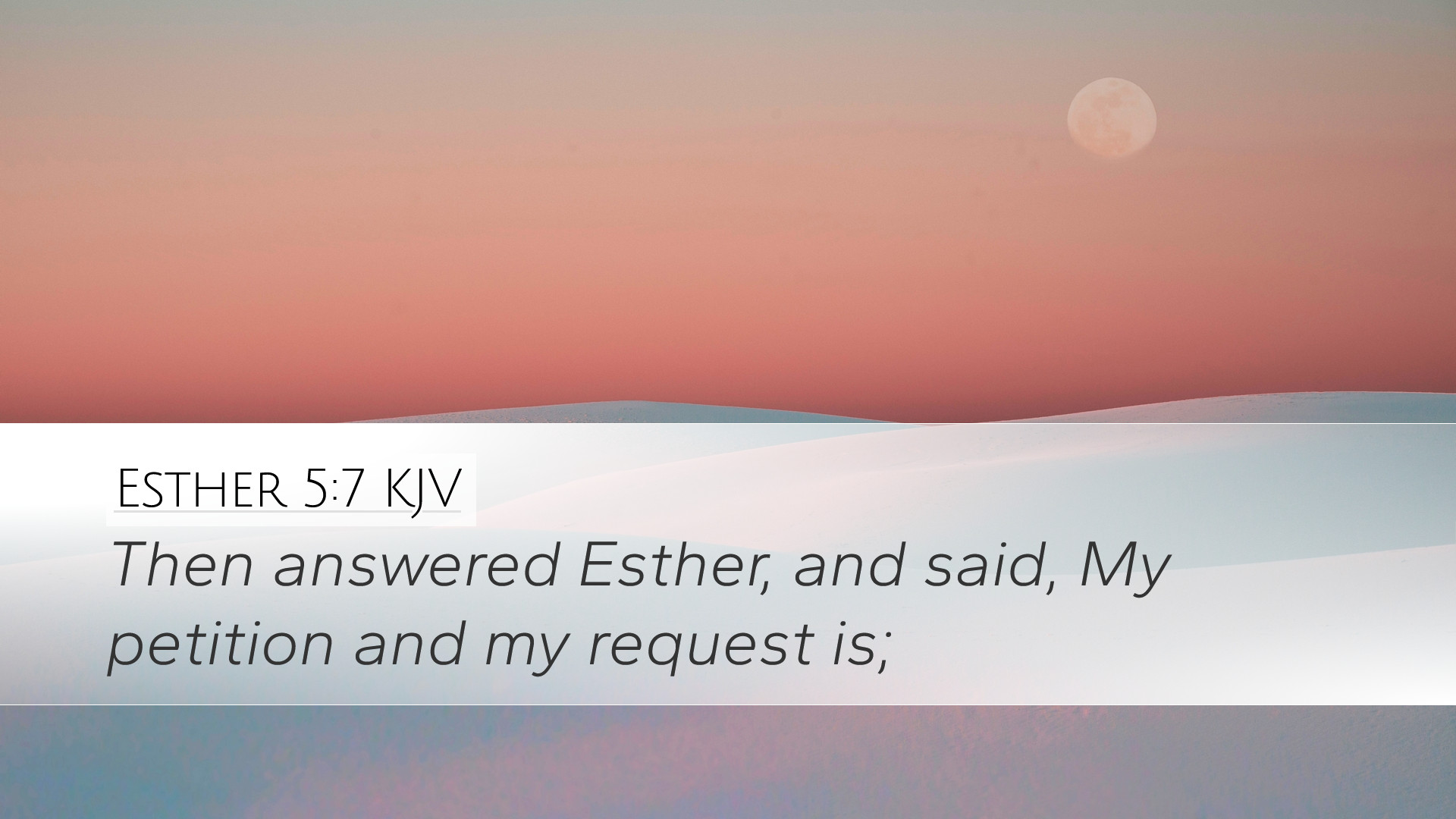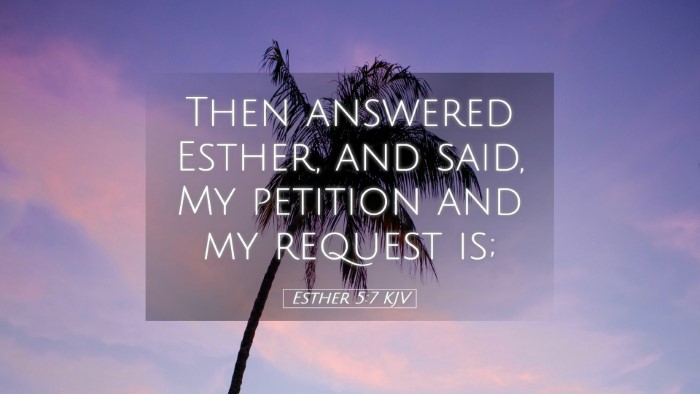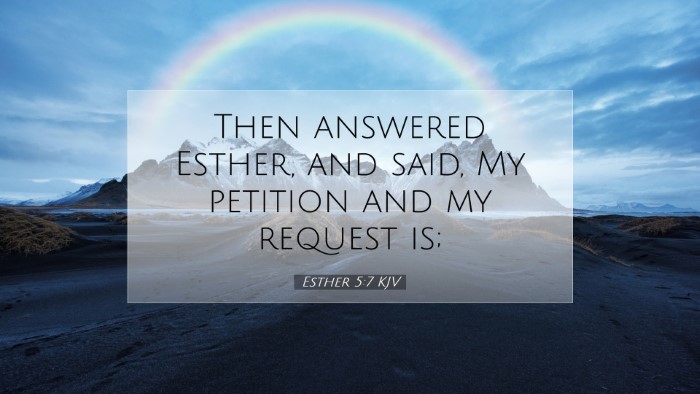Old Testament
Genesis Exodus Leviticus Numbers Deuteronomy Joshua Judges Ruth 1 Samuel 2 Samuel 1 Kings 2 Kings 1 Chronicles 2 Chronicles Ezra Nehemiah Esther Job Psalms Proverbs Ecclesiastes Song of Solomon Isaiah Jeremiah Lamentations Ezekiel Daniel Hosea Joel Amos Obadiah Jonah Micah Nahum Habakkuk Zephaniah Haggai Zechariah MalachiEsther 5:7
Esther 5:7 KJV
Then answered Esther, and said, My petition and my request is;
Esther 5:7 Bible Commentary
Commentary on Esther 5:7
Text of Esther 5:7: "Then Esther answered, and said, My petition and my request is," (Esther 5:7, KJV)
Introduction
The book of Esther presents a unique narrative in the Biblical canon, marked by themes of courage, providence, and identity. In Chapter 5, we encounter Esther's pivotal moment as she approaches King Ahasuerus to deliver her request. This verse encapsulates not only her boldness but also the careful preparation that characterized her approach. The following commentary integrates insights from notable public domain sources to enhance understanding for pastors, students, theologians, and scholars.
Context of the Passage
The events leading up to Esther 5:7 reveal a tapestry of divine orchestration. Esther, a Jewish orphan raised by her cousin Mordecai, ascends to the position of queen in the Persian Empire. Despite her elevated status, she faces the imminent threat against her people orchestrated by Haman, the king's high official. This context is crucial for understanding the gravity of her actions and the weight of her words.
Esther’s Decision to Approach the King
Before Esther approaches the king, she undergoes significant spiritual and emotional preparation. Her decision comes after three days of fasting and prayer, which indicates a profound dependence on divine guidance. According to Matthew Henry, “Prayer and fasting was her preface; she would not venture upon the king’s business without seeking God’s direction.” This highlights the theological principle of seeking God's will in moments of crisis.
The Significance of Her Petition
Esther's comment, “My petition and my request,” suggests a dual-layering of purpose. As Albert Barnes notes, “Esther’s words here are of great importance; they express her earnestness and the serious nature of what she is about to request.” This duality denotes both personal vulnerability and collective national urgency. Her request encompasses both her own safety and the safety of her people, indicating profound empathy and self-awareness.
The Role of Timing
The timing of Esther's approach is pivotal. Adam Clarke suggests that her strategy reveals a wisdom in understanding the king’s disposition, as “she chooses to delay her demand until the king's spirit is elevated by a banquet.” This insight stresses the importance of recognizing the right moment to present significant requests. Esther's actions remind us of the Scriptural principle that “there is a time for everything” (Ecclesiastes 3:1).
God’s Providence in Difficult Circumstances
The narrative surrounding Esther reflects God’s providence, subtly at work in every detail, even those that seem mundane. Henry emphasizes that even the king’s sleepless night prior to this event was part of divine orchestration, leading to the king’s inability to refuse Esther's request. “In all events, God has His hand; He ordereth all things, and turns even the hearts of kings as rivers of water, to accomplish His purposes.” This serves as an encouragement for believers to trust in God amidst life’s uncertainties.
Lessons for Today’s Readers
- The Importance of Preparation: Esther’s preparation through prayer and fasting illustrates the necessity of seeking God before undertaking meaningful ventures.
- Courage in the Face of Fear: Esther's willingness to approach the king exemplifies the courage required to stand in the gap for others, a calling still relevant today.
- Understanding the Power of Influence: As queen, Esther had a unique platform. Her use of influence to save her people serves as a model for how Christians can effect change in their spheres of influence.
- Trusting God’s Timing: The strategic nature of Esther's approach underscores the importance of discerning God’s timing in our own lives, reaffirming that we must wait for His perfect moment.
Conclusion
Esther 5:7 is a profound moment in the narrative of Esther, charged with implications for faith, leadership, and divine providence. This verse not only reveals Esther's commendable character but also sets the stage for the intercession of her people. By understanding the layers of her petition, modern readers can draw upon her example to inspire acts of courage, wisdom, and faithfulness in their own contexts.


